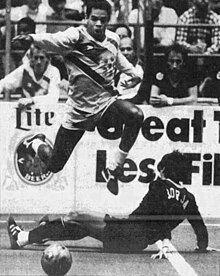| This article needs additional citations for verification. Please help improve this article by adding citations to reliable sources. Unsourced material may be challenged and removed. Find sources: "Baltimore Blast" 1980–1992 – news · newspapers · books · scholar · JSTOR (September 2023) (Learn how and when to remove this message) |
 | |
| Full name | Baltimore Blast |
|---|---|
| Founded | 1980 |
| Dissolved | 1992 |
| Ground | Baltimore Arena Baltimore, Maryland |
| Capacity | 11,271 |
| Manager | Kenny Cooper |
| League | Major Indoor Soccer League |
The Baltimore Blast were a longtime member of the Major Indoor Soccer League. From 1978 to 1980, the team played as the Houston Summit, but moved prior to the 1980–81 season. The team won the league's championship in the 1983–84 season. The team folded when the MISL ceased operation in the summer of 1992.
History
The aggressive promotion of the team by radio partner WFBR (then 1300 AM) was instrumental in the Blast's popularity. Art Sinclair and Charley Eckman handled the play-by-play.
The team was owned by Bernie Rodin, who also owned the Rochester Lancers and the New York Arrows. Mike Zolotorow was the long-time Equipment Manager for 20 years.

In the 1983–84 playoffs, Baltimore advanced to the championship series by defeating the New York Arrows 3–1 in the quarterfinal best-of-five series, then beating the Cleveland Force 3–0 in the semifinal series. In the best-of-seven championship series, Baltimore defeated the St. Louis Steamers 4–1 to claim the 1984 MISL championship.
In 1991, the Blast contested the Trans-Atlantic challenge, a one-off indoor soccer game at the Sheffield Arena in Sheffield, England. They beat English First Division team Sheffield Wednesday to win the trophy. Wednesday had American international John Harkes in their ranks. The game was the one and only occasion that Eric Cantona played for Sheffield Wednesday during his infamous trial.
Year-by-year
| Year | League | Reg. season | Playoffs | Attendance average |
|---|---|---|---|---|
| 1980–81 | MISL | 2nd, Atlantic | Semifinals | 6,540 |
| 1981–82 | MISL | 3rd, Eastern | Semifinals | 9,557 |
| 1982–83 | MISL | 1st, Eastern | Finals | 10,729 |
| 1983–84 | MISL | 1st, Eastern | Champions | 11,189 |
| 1984–85 | MISL | 1st, Eastern | Finals | 11,051 |
| 1985–86 | MISL | 4th, Eastern | Quarterfinals | 10,189 |
| 1986–87 | MISL | 2nd, Eastern | Division Semifinals | 9,936 |
| 1987–88 | MISL | 4th, Eastern | Division Semifinals | 8,221 |
| 1988–89 | MISL | 1st | Finals | 8,170 |
| 1989–90 | MISL | 1st, Eastern | Finals | 8,530 |
| 1990–91 | MSL | 3rd, Eastern | out of playoffs | 7,432 |
| 1991–92 | MSL | 4th | Semifinals | 8,206 |
Personnel
Head coach
 Kenny Cooper 1980–1992
Kenny Cooper 1980–1992
Players
 Robert Prentice 1981–1983
Robert Prentice 1981–1983
Retired numbers
| This list is incomplete; you can help by adding missing items. (October 2023) |

Arenas
- Baltimore Arena (1980–1992)
References
- Major Indoor Soccer League (1984). "MISL 1984–85 Media Guide". p. 67.
- "Blast to honor Reynolds". The Evening Sun. 18 October 1991. p. C6.
External links
- Baltimore Blast historical rosters via nasljerseys.com